6 Ways to Align Your ITAM Strategy with ESG Goals
Today, organizations face increasing pressure to balance operational efficiency with environmental responsibility. Due to this, two key areas have...
4 min read
![]() Zones
:
Mar 28, 2024 3:25:32 PM
Zones
:
Mar 28, 2024 3:25:32 PM
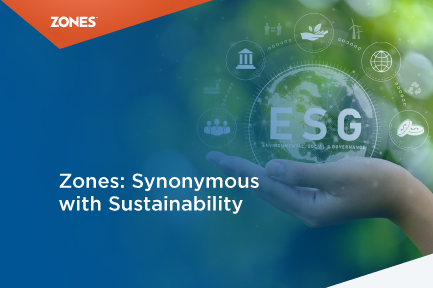
Sustainability and ESG (Environmental, Social, and Governance) have gained significant attention, transforming from a niche concern to a pivotal component of modern business practices. As awareness of global challenges intensifies, these concepts have become vital frameworks for driving positive change and fostering a more sustainable future.
This global shift toward sustainable business practices is a response to societal expectations and a strategic move for businesses to secure longevity. Their influence extends from risk mitigation and cost reduction to brand value enhancement.
The global digital sustainability and ESG services market is projected to reach over $100 billion by 2030, underscoring the enormous opportunities and the urgency for businesses to embrace sustainable practices.
The rapid rise of environmental and social issues on the global stage, coupled with a dynamic regulatory environment, has elevated sustainability from a moral obligation to a core pillar of corporate governance. Here are some of the key drivers shaping the sustainability landscape:
In recent years, sustainability has morphed from an optional corporate responsibility to a strategic imperative. Multinational corporations and large enterprises are no longer viewing sustainability through a narrow lens; instead, they are embracing it as a critical driver for innovation, resilience, and positive societal impact.
Investors these days are considering ESG factors in their decision-making processes. The financial community recognizes the link between sustainability practices and long-term financial performance, urging corporations to align their strategies with these principles
The modern consumer is environmentally conscious and values ethical business practices. Because of this shift, businesses are adapting to meet the demands of a market that seeks quality products and ethical and sustainable sourcing.
Evolving regulatory landscapes are compelling businesses to adopt sustainable practices. From emissions standards to waste management, adherence to environmental regulations is no longer optional.
|
Also Read: 6 Ways Organizations Can Achieve Sustainable IT in 2024 |
Organizations must strategically integrate sustainability into their operations to remain competitive and resilient in an ever-evolving landscape. This may involve reevaluating supply chains, adopting circular economy practices, and harnessing technology for sustainable innovation.
This also signifies an understanding among companies that their impact extends beyond shareholders to encompass a spectrum of stakeholders, including employees, customers, and the communities in which they operate. They are key drivers impacting companies' financial performance and shareholder portfolios.
However, as an increasing number of companies are stepping up to align their business with global environmental and sustainable goals, they also need to meet the demand for transparency, standardization, and reporting of their sustainability practices year over year.
To ensure companies follow the right sustainability practices, consulting and research firms like ISG (Information Services Group) assess, evaluate, and recognize companies and service providers via industry reports. This involves featuring companies that have integrated sustainability into their core operations and have been transparent about their goals, focus, and contribution.
These reports highlight how service providers are adopting innovative solutions to reduce carbon footprints, optimize resource use, and enhance diversity and inclusion.
ISG has recently released a quadrant report known as the ISG Provider Lens™, recognizing and featuring organizations for sustainability and ESG. This report evaluates and acknowledges organizations that go beyond conventional practices, contributing significantly to sustainability and ESG goals.
The companies are positioned in this report across different categories of services and solutions: Strategy and Enablement Services, Technology Solutions and Implementation Services – IT, Technology Solutions and Implementation Services – OT, Data Platforms and Managed Services, and Rating and Benchmarking Services (Global).
The positioning in the report is based on an organization’s suitability for a defined market segment regardless of company size and industry. The ISG Provider Lens™ quadrants are created using an evaluation matrix containing four segments (Leader, Product Challenger, Market Challenger, and Contender) and the providers are positioned accordingly.
Within the recently published ISG Report in 2023, Zones has been featured as a Market Challenger for Sustainability and ESG for the U.S. market, earning recognition for its exemplary commitment to sustainability. This acknowledgment is a testament to Zones' strategic ability to align its operations with the broader goals of a sustainable future with end-to-end IT sustainable device solutions and its commitment to driving positive change through innovative and eco-friendly technology solutions.
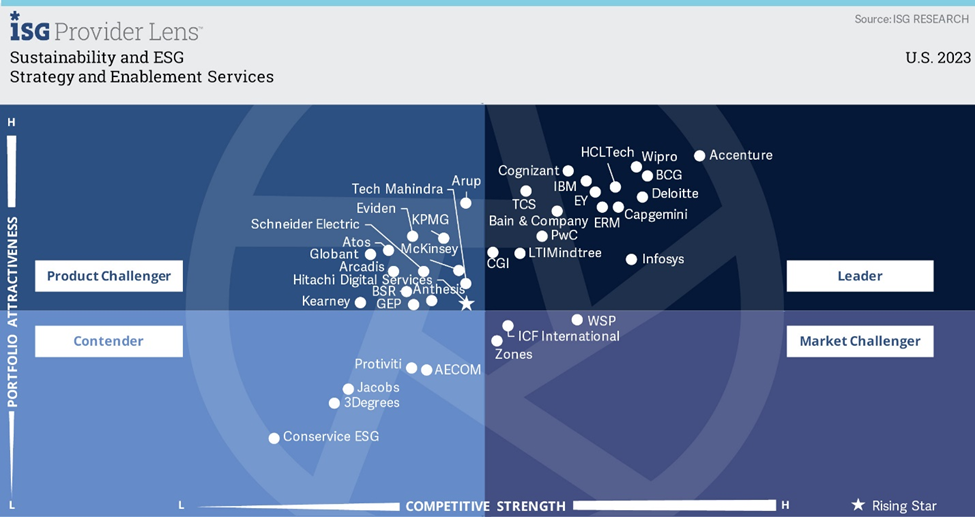
Source: ISG Provider LensTM Research – Sustainability and ESG (Environmental, Social, Governance)
Zones' comprehensive service portfolio covers digital workplace, networking, cloud and data center, security, and managed services, embodying a commitment to sustainability throughout the hardware and solution lifecycle.
With relationships extending to over 5,000 IT ecosystem partners, Zones seamlessly aligns hardware with software, offering clients an expansive ecosystem that ensures investment protection.
Zones employs advanced technologies, including its exclusive IntelliPlanSM feature, integrating AI and algorithms for IT technology forecasting. This forward-looking approach reduces lead times, minimizes cost fluctuations, and decreases overall operating costs.
With R2v3 and ISO 45001 certifications, Zones ensures sustainable governance in end-to-end asset recycling and client hardware disposal, underscoring its dedication to environmental sustainability.
Zones offers an end-to-end global supply chain as a service, including order and inventory management, distribution, and predictive analysis for optimized stock control, all aligned with R2v3 standards.
Here’s what the ISG leadership said about Zones’ sustainability and ESG practices:
Iain Fisher, Director – Future of Work, Customer Experience & ESG Lead, ISG, said, “One of the more important areas in the workplace that drives sustainable reporting outcomes, as well as having a bottom-line impact, is IT Repurposing as a Service. Device Providers are racing to offer a service that can offer near-net zero emissions and 50-70% cost reduction to enterprises. Zones has been shaping this service, primarily in the U.S. for a number of years. Being at the top of the maturity curve is probably the most important factor to consider when it comes to choosing a partner for your strategic response in this area. This makes Zones a key provider of choice.”
Zones' recognition as a Market Challenger in the 2023 ISG Sustainability and ESG Report is not the culmination of its sustainability journey but rather a milestone in an ongoing commitment. The future roadmap, with ambitious goals of achieving significant emissions and carbon footprint reductions, reinforces Zones' dedication to a sustainable and responsible future.
As the world continues to grapple with environmental challenges, Zones invites businesses looking to align their operations with sustainable practices. Learn more about our sustainable IT solutions and how we can benefit your organization.
Explore our sustainability initiatives and certification to discover how our comprehensive services can help you embark on your sustainability journey and contribute to a greener, more responsible future.
Ready to embark on a sustainable journey?
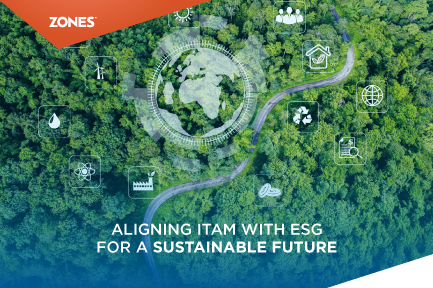
Today, organizations face increasing pressure to balance operational efficiency with environmental responsibility. Due to this, two key areas have...
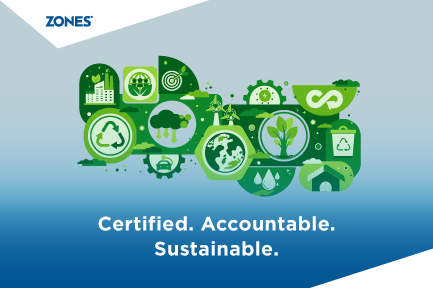
Measuring What Matters: Recent Achievements by the Numbers In an era where corporate responsibility extends far beyond profit margins, technology...
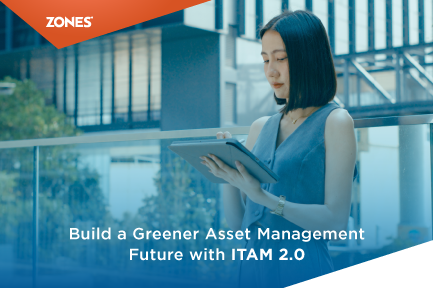
The management of IT assets has undergone a significant transformation in recent years. What began as simple inventory tracking has evolved into a...